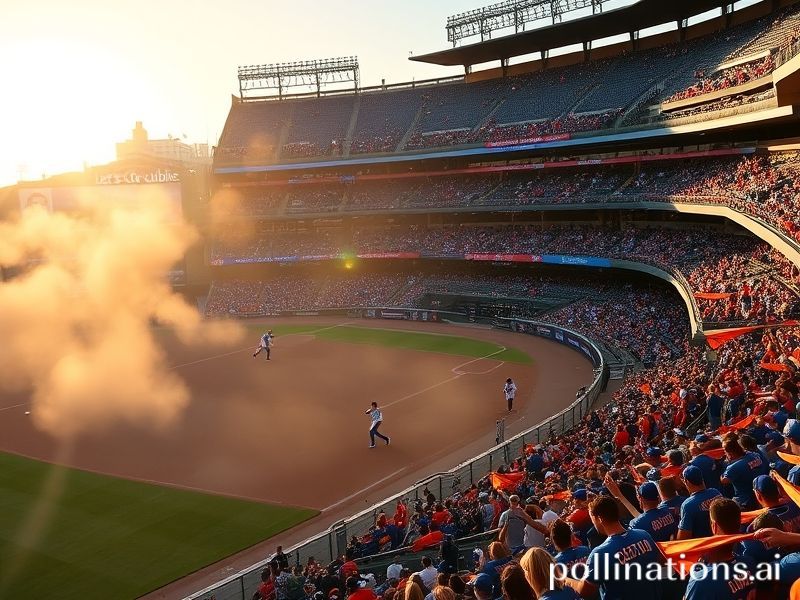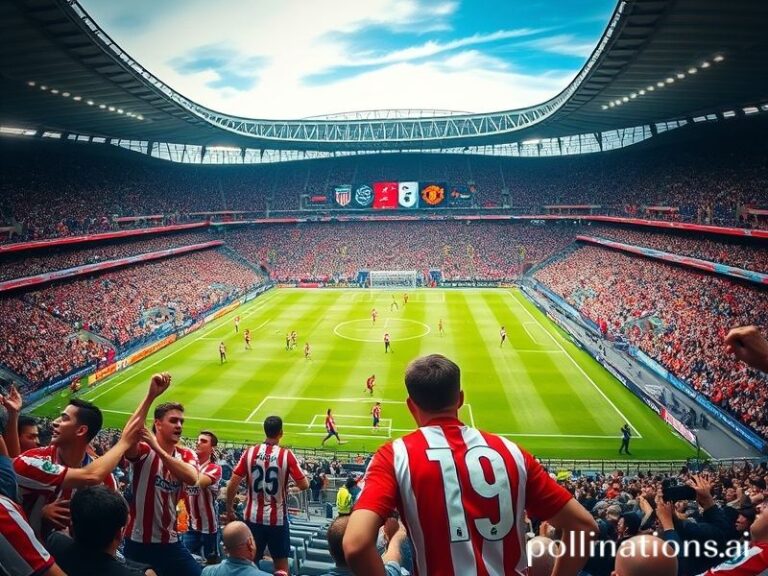Mets vs Cubs: How a Meaningless Baseball Game Became a Global Spectacle of Late-Stage Capitalism
In the wee hours between Wall Street closing and the Nikkei opening, two professional baseball clubs from the American Midwest—geographic trivia that still baffles most of the planet—met under Queens’ sodium lights to decide precisely nothing. The New York Mets and the Chicago Cubs, franchises whose combined payroll could refinance a small Balkan republic, squared off in a contest whose global significance is roughly on par with a Swiss canton’s yodeling championship. Yet satellites carried every pitch from Flushing to Fiji, proving once again that late-stage capitalism will monetize anything, including grown men in elastic pants arguing about a leather sphere.
From a strictly terrestrial perspective, the game mattered only to the 41,000 ticket-holders who paid New York rents for stadium beer and the 37 remaining Cubs fans still clinging to a century-old inferiority complex. But zoom out to geostationary orbit and the affair becomes a tidy metaphor for the 21st-century order: two rich cities, bloated on quantitative easing and artisanal doughnuts, staging ritual combat while the rest of the world worries about grain shortages and rising seas. When the Mets’ closer—imported from the Dominican for the cost of a rural hospital—pumped a 98-mph fastball past a Slovenian-born Cub (yes, really), the international feed cut to a soft-drink ad featuring Korean pop stars. Somewhere in the algorithmic ether, a data broker updated our psychological profiles.
The box score, for those who enjoy numerical haikus, showed the Mets edging the Cubs 4–3 in eleven innings, a duration that allowed Tokyo traders to watch the entire game before their morning commute. Wagers fluttered across time zones: Manila bookies reported brisk action on “first baseman’s total blinks,” while London analysts shorted both teams’ playoff chances with the same glee they reserve for emerging-market currencies. In São Paulo, a bar full of insomniacs cheered when the Cubs’ bullpen imploded, less out of affection for New York than from the innate human delight in watching someone else’s disaster unfold in high definition.
Meanwhile, the United Nations released a report estimating that the electricity burned to illuminate Citi Field could have powered rural Rwanda for a week. The Mets’ social-media team celebrated the win with a GIF of anthropomorphic oranges dancing—Florida produce, naturally—while the Cubs counter-posted a melancholy piano arrangement over black-and-white footage of happier days, i.e., 2016, when they briefly mattered. Both tweets racked up millions of engagements, proving that irony is the only truly universal language.
Back in Queens, post-game interviews unfolded like a hostage video scripted by a branding consultant. The Mets’ manager praised “grit” and “resilience,” two words that have never appeared in a central-bank communiqué but somehow justify nine-figure payrolls. The Cubs skipper lamented “a couple of bad breaks,” which, translated from manager-ese, means his relief pitcher couldn’t hit water from a boat. A Japanese reporter asked whether the outcome increased the probability of a subway-series apocalypse; the interpreter diplomatically rendered the reply as “we’re taking it one day at a time,” thereby preserving the illusion that any of this is under human control.
And so the Mets improve to a record that will be forgotten by November, while the Cubs drop another game en route to mathematical elimination sometime around the autumn equinox. The world spins on: container ships queue outside Los Angeles, methane leaks in Siberia, and a cryptocurrency named after a dog flatlines. Yet for three hours, plus the bureaucratic bonus of extra innings, the planet’s attention converged on a patch of grass in Queens where millionaires in pajamas performed the same futile ballet their grandfathers did, only now with better cameras and worse music.
In the end, the final score was less important than the reminder that humans will always invent elaborate distractions from entropy. Whether you call it baseball, football, or parliamentary democracy, the principle is identical: keep the crowd watching the small chaos so they miss the big one. The Mets won, the Cubs lost, and somewhere a glacier shrugged. Play ball.







